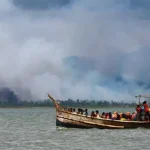WASHINGTON: Foreign Minister Bilawal Bhutto-Zardari has proposed informing Pakistan’s neighbors that the TTP’s prohibition is an “absolute red line” and that no one can cross it.
It is unquestionably our red line when it comes to the TTP (Tehreek-i-Taliban Pakistan). Speaking on Tuesday evening at the Atlantic Council in Washington, the foreign minister stated, “It is something that we will not tolerate.”
“And absolutely we will be willing to consider every option in order to guarantee the safety and security of our people,” the statement reads.
Pleasure speaking at @AtlanticCouncil on Pakistan-US relations, our ongoing cooperation in flood recovery, rehabilitation and reconstruction and regional situation. pic.twitter.com/SWSyWQZmx7
— BilawalBhuttoZardari (@BBhuttoZardari) December 21, 2022
Pakistan’s UN Ambassador Munir Akram told the UN Security Council in New York that engagement with the Taliban was the best option for stabilizing the region. The foreign minister emphasized the need to combat militants in his Washington speech.
Isolation and coercion have not worked in the past; While participating in a UN discussion on the situation in Afghanistan, Ambassador Akram stated, “they will prove to be counter-productive now and in the future.” The Pakistani envoy stated to the 15-member Council, “We need a coherent and practical plan to realize the international community’s objectives through patient engagement with the interim government.”
In his speech to the Atlantic Council, Mr. Bhutto-Zardari made a similar observation and urged world powers to collaborate with Afghanistan’s de facto rulers to stabilize the region. The minister suggested using the “hammer and anvil” strategy to eliminate militancy with Kabul’s cooperation when the moderator, Uzair Younus, asked if Pakistan could deploy troops inside Afghanistan or on the border to stop attacks by Afghanistan-based militant groups.
Even though there have been border and cross-border attacks, the chief Pakistani diplomat said that the situation is much safer and more stable now than it was in 2007, when Pakistan launched a series of operations against the TTP and other militants.
“In any case, those things can be endangered in the event that this continues without some kind of restraint. And it goes without saying that, regardless of whether CPEC or any other type of economic activity is involved, that would damage any hope. In order to conduct business, no one wants to put lives in danger, he warned.
This is why I have been particularly pessimistic regarding the TTP and terrorism in general. Not only the incidents at the border but also the recent Bannu incident, which our security commanders bravely overcame, are, in my opinion, troubling developments in the region.
However, the foreign minister emphasized the necessity of “impressing on our neighbors, particularly Afghanistan” that they must demonstrate their ability to take on the TTP or other groups operating there.
He acknowledged that Pakistan’s Afghan policy could be improved, just like America’s, and that “we need to be serious about what we can do going forward.”
He questioned, “Are we going to learn from our mistakes to ensure that we do not repeat them?” The answer to that question will define Afghanistan’s safety and stability, Pakistan’s safety and stability, and our region’s safety and stability.
He said that Pakistan’s best option was to get the Afghan interim government to show that they could handle this problem.
In addition, the foreign minister met with Deputy Secretary of State Wendy R. Sherman, and the two of them talked about Pakistan’s efforts to recover from devastating floods as well as the upcoming International Conference on Climate Resilient Pakistan, which will be held in Geneva on January 9.
The US official pledged to strengthen bilateral cooperation and expressed condolences for Pakistani victims of recent terrorist attacks, according to a State Department readout.






